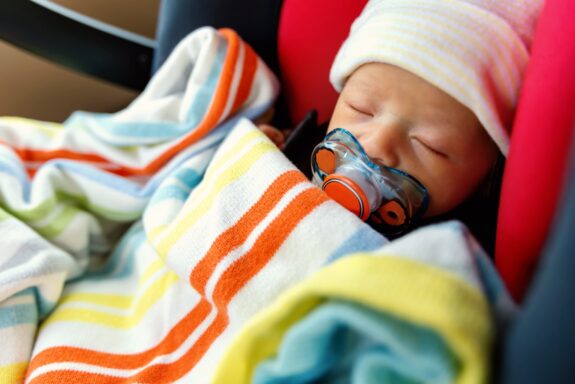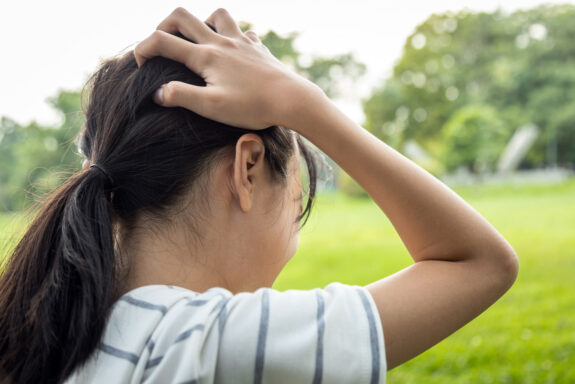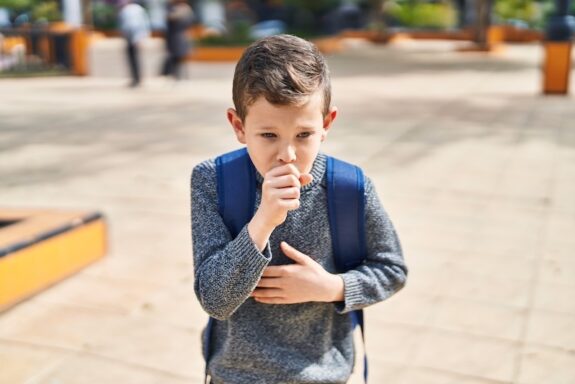What is diarrhea?
Diarrhea is the passage of watery stools.
What causes diarrhea?
Most diarrhea in children is caused by one of several diarrhea-causing viruses and gets better by itself within a week. Although there can be many causes of diarrhea, the treatment suggested here is appropriate for acute illness (sudden onset, short lasting), which occurs most commonly.
A child with viral diarrhea has a fever and often starts the illness with some vomiting. Shortly after these symptoms appear, the child develops diarrhea. Often children with viral diarrhea “feel bad,” but do not act ill.
You should call your pediatrician if your child is less than 6 months of age or has any of the following:
- blood in stool
- frequent vomiting
- abdominal pain
- urinates less frequently (wets fewer than 6 diapers per day)
- no tears when crying
- loss of appetite for liquids
- high fever
- frequent diarrhea
- dry, sticky mouth
- weight loss
- extreme thirst
- It is not necessary to call your pediatrician if your child continues to look well even though there may be
- frequent or large stools
- lots of intestinal gas
- green or yellow stools
How long will the diarrhea last?
Most of the time mild diarrhea lasts from 3 to 6 days. Occasionally a child will have loose stools tor several days longer. As long as the child acts well and is taking adequate fluids and food, loose stools are not a great concern.
Mild illness and diet
Most children should continue to eat a normal diet including formula or milk while they have mild diarrhea. Breastfeeding should continue. If your baby seems bloated or gassy after drinking cow’s milk or formula, call your pediatrician to discuss a temporary change in diet.
Special fluids for mild illness
These are not usually necessary for children with mild illness.
Moderate illness
Children with moderate diarrhea can be cared for easily at home with close supervision, special fluids, and your pediatrician’s advice. Your pediatrician will recommend the amount and length of time that special fluids should be used. Later, a normal diet can be resumed. Some children are not able to tolerate cow’s milk when they have diarrhea and it may be temporarily removed from the diet by your pediatrician. Breastfeeding should continue.
Special fluids for moderate illness
Special fluids (called electrolyte solutions) have been designed to replace water and salts lost during diarrhea. These are extremely helpful for the home management of mild to moderately severe illness. Do not try to prepare these special fluids yourself. Use only commercially available fluids-brand-name and generic brands are equally effective. Your pediatrician or pharmacist can tell you what products are available.
If a child is not vomiting, these fluids can be used in very generous amounts until the child starts making normal amounts of urine again.
If your child develops the warning signs of illness listed on the first page, he or she may require IV fluids in the emergency department for several hours to correct dehydration. Usually hospitalization is not necessary. Immediately seek your pediatrician’s advice for the appropriate care if symptoms of severe illness occur.
Common Illnesses and Conditions
Commonly asked Questions
Q. Should a child with diarrhea be fasted?
A. Absolutely not. Once she is rehydrated, let the child eat as much or as little of the usual diet as she wants. If she is vomiting, offer small amounts of fluids frequently.
Q. What about soft drinks, juices, or boiled skim milk?
A. A child with mild diarrhea can have regular fluids. But if there is enough diarrhea to make your child thirsty, he must have special fluids (see Special fluids for moderate illness). Soft drinks, soda pop, soups, juices, sports drinks, and boiled skim milk have the wrong amounts of sugar and salt and may make your child sicker.
Q. What about anti-diarrhea medicines?
A. These medicines are not useful in most cases of diarrhea and can sometimes be harmful. Never use them unless they are recommended by your pediatrician.
Q. Which therapy is best?
A. Because diarrhea is so common, there are many different home remedies that have been tried through the years Some of these old ideas may not be effective and some may actually make things worse. The recommendations in this article are based on the best information available at this time. If you have any questions about them, please check with your pediatrician.
Reminder-dos and don’ts
DO
- Watch for signs of dehydration which occur when a child loses too much fluid and becomes dried out. Symptoms of dehydration include a decrease in urination, no tears when baby cries, high fever, dry mouth, weight loss, extreme thirst, listlessness, and sunken eyes.
- Keep your pediatrician informed if there is any significant change in how your child is behaving.
- Report if your child has blood in his stool.
- Report if your child develops a high fever (more than 102°F or 39°C).
- Continue to feed your child if she is not vomiting. You may have to give your child smaller amounts of food than normal or give your child foods that do not further upset his or her stomach.
- Use diarrhea replacement fluids that are specifically made for diarrhea if your child is thirsty.
DON’T
- Try to make special salt and fluid combinations at home unless your pediatrician instructs you and you have the proper instruments.
- Prevent the child from eating if she is hungry.
- Use boiled milk or other salty broth and soups
- Use anti-diarrhea medicines unless prescribed by your pediatrician
The information contained in this publication should not be used as a substitute for the medical care and advice from your pediatrician. There may be variation in treatment that your pediatrician may recommend based on individual facts and circumstances.
Copyright © American Academy of Pediatrics 1996



